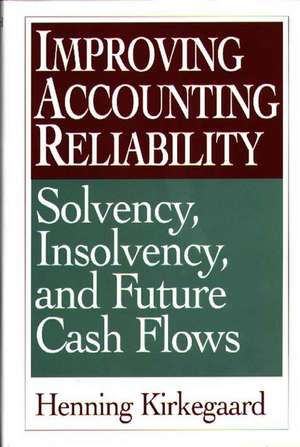Improving Accounting Reliability: Solvency, Insolvency, and Future Cash Flows
Autor Henning Kirkegaarden Limba Engleză Hardback – 29 oct 1997 – vârsta până la 17 ani
Preț: 441.56 lei
Preț vechi: 606.33 lei
-27% Nou
Puncte Express: 662
Preț estimativ în valută:
84.52€ • 91.84$ • 71.04£
84.52€ • 91.84$ • 71.04£
Carte tipărită la comandă
Livrare economică 21 aprilie-05 mai
Preluare comenzi: 021 569.72.76
Specificații
ISBN-13: 9781567201437
ISBN-10: 1567201431
Pagini: 352
Dimensiuni: 156 x 235 x 23 mm
Greutate: 0.72 kg
Editura: Bloomsbury Publishing
Colecția Praeger
Locul publicării:New York, United States
ISBN-10: 1567201431
Pagini: 352
Dimensiuni: 156 x 235 x 23 mm
Greutate: 0.72 kg
Editura: Bloomsbury Publishing
Colecția Praeger
Locul publicării:New York, United States
Notă biografică
HENNING KIRKEGAARD is an Associate Professor and researcher at the Copenhagen Business School. Author of numerous journal articles in Danish and English and ten earlier books (including a version of this book under a different title) published in Danish, he has broad, practical experience in the design and use of financial and management information systems. He is also credited with the rediscovery, in 1984, of the original nature of double-entry bookkeeping.
Cuprins
Foreword by C. Torben ThomsenPrefaceInnovation Depends on Keen DebateAccounting and the Loss of RealityDo We Understand Financial Statements?Solvency and Liquidity, Insolvency and IlliquidityTraditional Accounting RegistrationFinancial Statements: The Confusing Images of Past EventsThe Good Manager and the Problem of ResponsibilityOops, Another Unpleasant SurpriseLike Working for an UndertakerImprudent PrudenceThe Objective of Financial StatementsTime and Money in Financial StatementsNew Basic Concepts of Accounting TheoryThe New Measurement System: Justification and Basic FormThe Logic and Elements of SolvencyA Real-Time Description of SolvencyThe Financial Database: The New Audit TrailThe Future of AccountingReferences







